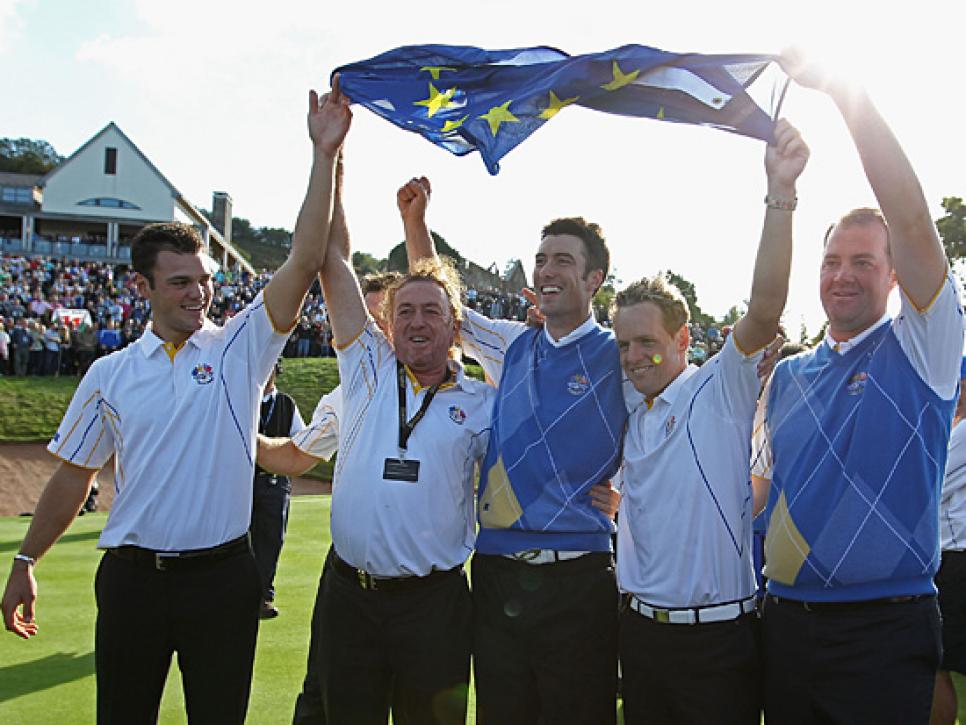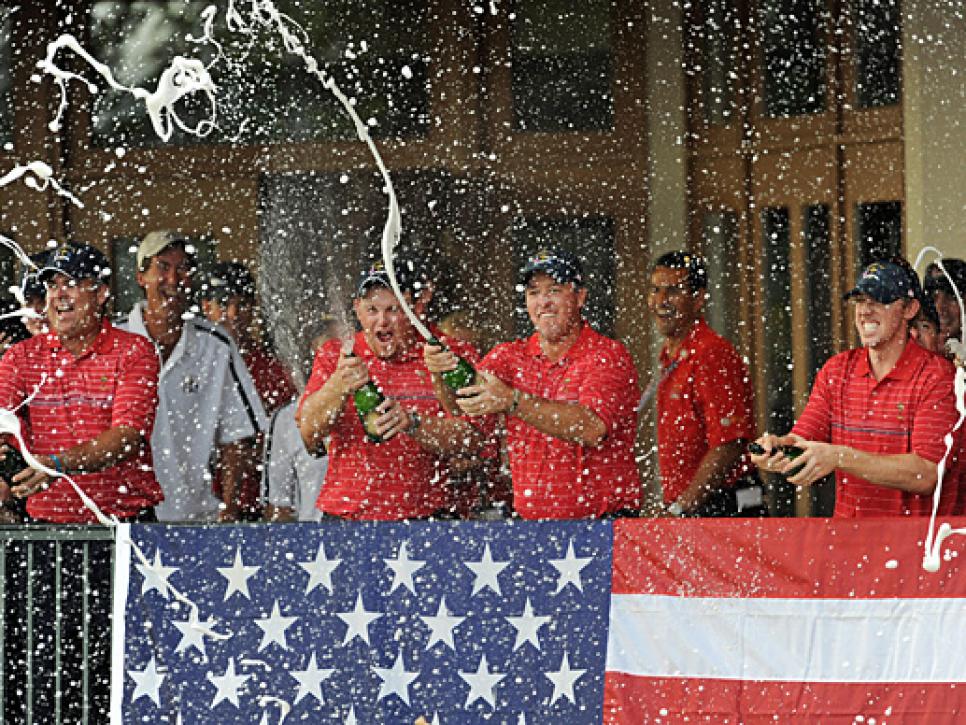News
Picking Sides

Europe has gone 8-4-1 in the biennial competition since 1985.
WHY EUROPE WILL WIN
__By Ron Sirak
__
There are several reasons why Europe will win the Ryder Cup for the seventh time in the last nine run-ins with the United States in this biennial trans-Atlantic skirmish. Chief among them is that the European players embrace the moment better than the Yanks. They will have fun at Medinah and be drinking Guinness from Samuel Ryder's cup Sunday night.
When it comes to attitude, the Europeans are 2-up before a ball is ever struck. The Euro side treats the hoopla hovering around the competition as if it were a weeklong fraternity party, savoring every moment, while the Americans act as if it is seven visits to the dentist. The Europeans feed off the singing, dancing, chanting and occasional jeering. The Americans act as if they are annoyed by it all.
Perhaps that's because Europeans are simply more use to international competition, what with Champions League football -- soccer to Americans -- and all. One thing you notice following the European players on Twitter is that they are all passionate about football and establish camaraderie among each other with good-natured teasing about their loyalties.
And perhaps the run of recent success by the Europeans also has to do with the remarkable ability of the blue-and-gold side to portray itself as the underdogs, no matter how many times they win. The Euros to a man seem to play with a healthy chip on their collective shoulders, a defiant attitude that screams of the mental toughness Seve Ballesteros taught his teammates.
This European squad is also more experienced and more successful in the Ryder Cup than the side that will be wearing red, white and blue -- or whatever goofy clothing choices the Americans come up with this year. While the Americans have a combined 29 Cups under their white belts and Europe only 26, the Yanks have four Ryder Cup rookies compared to only Nicolas Colsaerts for Europe.
And then there is the matter of the records. Europe is a combined 60-32-18, with seven players sporting winning records. The Americans are 41-59-17 and no one has a winning record -- with only Steve Stricker and Zach Johnson at 3-3-1 not having lost more points than they've won.
Tiger Woods, Phil Mickelson and Jim Furyk -- the three most-experienced Americans with 21 Ryder Cups among them -- are a combined 32-46-12. The four Europeans with the most experience -- Luke Donald, Sergio Garcia, Ian Poulter and Lee Westwood with 19 Cups -- are a combined 46-22-11.
And then there is the matter of the team formats. The side Europe is sending out this year is 27-9-7 in alternate shot, while the Americans are 12-22-9; the Euros are 21-10-10 in better ball with the Yanks 14-26-6. And the singles situation is not as one-sided for the Americans as many think. The U.S. team is 15-11-2 and Europe is 12-13-1.
In Rory McIlroy, Europe has the best player in the world. Add in Donald, Westwood and Justin Rose and you have four of the top five in the world ranking. Europe even has the advantage in the Ryder Cup records of the captain. Jose Maria Olazabal was 18-8-5 in seven Ryder Cups while Davis Love III was 9-12-5 in six competitions.
Since 1985, Europe is 8-4-1 and that lone halve kept the Ryder Cup on the east side of the Atlantic since Europe was the defending champion. Nine of the last 13 times Europe has gone home with the tiny little trophy that is the most coveted in team golf. That is quite simply domination.
Come Sunday night, in the suburbs of Chicago, that trophy will be packed up once again and headed back to Europe. This European team is simply deeper, more experienced and better equipped mentally to handle Ryder Cup week. Make it 15-13 and see you at Gleneagles in Scotland in 2014.
WHY THE U.S. WILL WIN
__By John Huggan
__
The good news for Jose Maria Olazabal and his merry band of Europeans is that I am nearly always wrong when it comes to Ryder Cup predictions. With the exception of the 2006 matches at the K Club -- when the U.S. side was surely the weakest in history, a characteristic noticeable even to me before the off -- I have unerringly chosen the eventual losing team to win, and vice versa.

So it is that, this time, I side with the Americans -- albeit narrowly -- with a justifiable sense of trepidation. No matter how, well, logical, my attempted logic may look and sound, it has nearly always failed to make the leap into reality. But here goes anyway.
One aspect of the visiting side at Medinah bothers me. Were the Europeans collectively a racehorse, they would be classed as "one paced." For more than half of the players, the strength of their games is in ball-striking rather than pitching, chipping and putting (especially putting). I'm thinking of guys like Lee Westwood, Paul Lawrie, Francesco Molinari, Peter Hanson, Martin Kaymer, Nicolas Colsaerts, Sergio Garcia and Justin Rose. It can even be argued that world No. 1 Rory McIlroy falls into the same category. Which is not to say that their work on and around the greens is weak, of course. That would be silly. But it is true to say that the shorter shots are, generally speaking, not top of their respective lists of things to do.
For me, that's at least potentially important. Think about it. In stroke play at the highest level of the game, players do not separate themselves from their competition to any great extent through their work from tee-to-green. At the turn of the century, Tiger Woods did not win the U.S. Open and the Open Championship by multiple shots by dint of his long game. Oh no. It was his unerring putting that produced those huge margins of victory. Around that time it is hard to recall the 14-time major champion ever missing a makeable putt.
And the same is true in match play. In fact, putting -- especially from short range -- is more often than not the key to winning and losing. Just as it is amazing what score any golfer can shoot when he doesn't miss from inside, say, six feet, that same player becomes incredibly difficult to overcome in a head-to-head encounter. Not only does holing-out well do wonders for the numbers on his "card," he offers his opponent nothing by way of encouragement. Not for nothing is there an old cliché in match play golf: good putters are hard to beat.
So it is on the greens where I see this Ryder Cup being won and lost. Which is hardly a unique or original theory, but one that is particularly applicable given the relative strengths and weaknesses of these -- overall -- evenly-matched squads.
America by a point.